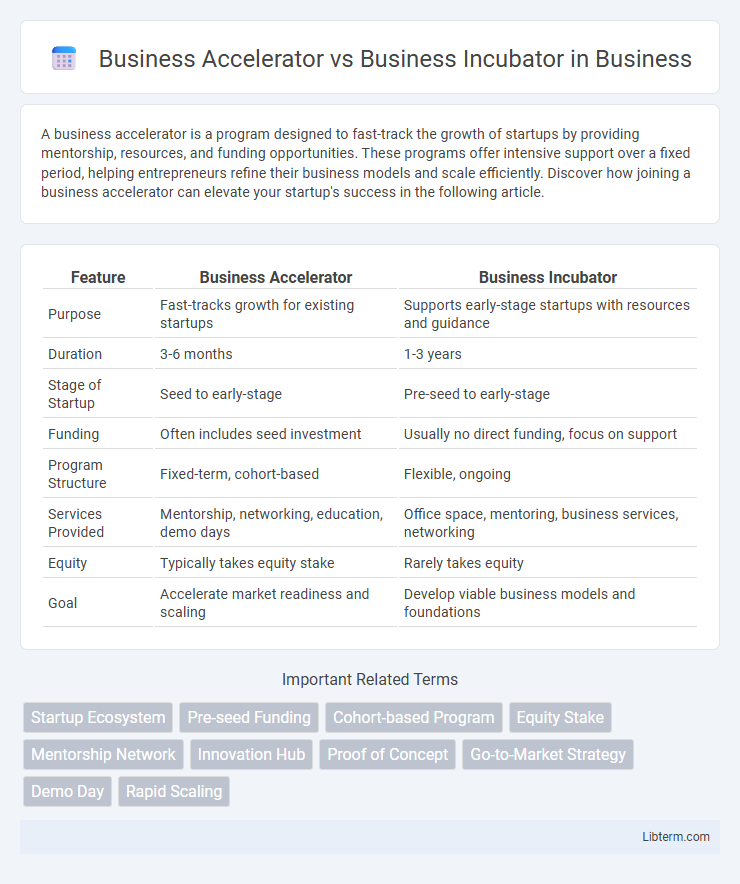A business accelerator is a program designed to fast-track the growth of startups by providing mentorship, resources, and funding opportunities. These programs offer intensive support over a fixed period, helping entrepreneurs refine their business models and scale efficiently. Discover how joining a business accelerator can elevate your startup's success in the following article.
Table of Comparison
| Feature | Business Accelerator | Business Incubator |
|---|---|---|
| Purpose | Fast-tracks growth for existing startups | Supports early-stage startups with resources and guidance |
| Duration | 3-6 months | 1-3 years |
| Stage of Startup | Seed to early-stage | Pre-seed to early-stage |
| Funding | Often includes seed investment | Usually no direct funding, focus on support |
| Program Structure | Fixed-term, cohort-based | Flexible, ongoing |
| Services Provided | Mentorship, networking, education, demo days | Office space, mentoring, business services, networking |
| Equity | Typically takes equity stake | Rarely takes equity |
| Goal | Accelerate market readiness and scaling | Develop viable business models and foundations |
Introduction to Business Accelerators and Incubators
Business accelerators are intensive, time-limited programs designed to rapidly scale startups through mentorship, funding, and network access, typically lasting three to six months. In contrast, business incubators offer long-term support by providing office space, resources, and advisory services to early-stage businesses, often spanning months to years. Both structures aim to foster startup growth but differ significantly in duration, focus, and stage of intervention.
Defining Business Accelerators
Business accelerators are fixed-term, cohort-based programs designed to rapidly scale early-stage startups through intensive mentorship, seed funding, and access to investor networks. Unlike business incubators that provide long-term support and resources for nurturing ideas, accelerators emphasize speed, milestones, and pitch readiness to prepare startups for rapid growth and funding rounds. Key entities like Y Combinator and Techstars epitomize accelerator programs that significantly boost startup valuation and market entry velocity.
Understanding Business Incubators
Business incubators support early-stage startups by providing resources such as office space, mentorship, and access to funding networks, facilitating business development during the crucial initial phases. Unlike business accelerators that focus on rapid growth over a fixed period, incubators emphasize long-term nurturing and tailored support to build a solid foundation. Key characteristics of incubators include flexible timelines, industry-specific expertise, and community networking opportunities that enhance startup survival rates and innovation capacity.
Key Differences Between Accelerators and Incubators
Business accelerators provide time-limited, cohort-based programs focused on rapid growth, often including seed investment, mentorship, and networking opportunities. Business incubators offer longer-term support, providing resources like office space, administrative assistance, and guidance to early-stage startups without a fixed timeline. The key difference lies in accelerators emphasizing speed and scaling within months, while incubators foster gradual development over years.
Funding and Investment Opportunities
Business accelerators typically provide startups with seed funding, mentorship, and access to a network of investors in exchange for equity, accelerating growth within a fixed timeframe. Business incubators offer longer-term support without immediate equity stakes, focusing on nurturing early-stage companies through resources, workspace, and guidance, often relying on grants or sponsoring institutions for funding. Investment opportunities in accelerators are more direct and investor-driven, while incubators emphasize developmental support with potential for later-stage investment connections.
Duration and Program Structure
Business accelerators typically run intensive, fixed-term programs lasting 3 to 6 months, offering structured mentorship, networking, and seed funding to rapidly scale startups. In contrast, business incubators provide longer-term support, often spanning 1 to 3 years, with flexible or open-ended structures focused on developing business ideas, resources, and infrastructure. The accelerator's cohort-based, fast-paced model contrasts with the incubator's gradual, resource-rich environment tailored for early-stage ventures.
Mentorship and Support Services
Business accelerators provide intense mentorship and structured support services designed to rapidly scale startups, often including expert guidance, access to networks, and tailored business development resources within a fixed time frame. Business incubators offer ongoing mentorship and a broader range of support services such as office space, administrative assistance, and long-term developmental guidance aimed at nurturing early-stage companies. The mentorship in accelerators is typically more aggressive and goal-oriented, while incubators focus on foundational growth and sustained support.
Target Audience and Business Stage
Business accelerators primarily target startups with a validated product seeking rapid growth and scaling opportunities, typically in the early to growth stages. Business incubators focus on nascent ventures or idea-stage entrepreneurs requiring foundational support, mentorship, and resources to develop their business models. Accelerators often have a fixed-term, cohort-based program, while incubators offer more flexible, long-term assistance tailored to early-stage development.
Application Process and Selection Criteria
Business accelerators typically have a highly competitive application process, focusing on startups with a minimum viable product (MVP), strong growth potential, and a scalable business model. Business incubators often accept early-stage businesses and may have a more inclusive selection process, emphasizing the founder's commitment and local economic impact. Selection criteria for accelerators prioritize rapid scalability, market traction, and team strength, while incubators focus on long-term development, resource needs, and alignment with community resources.
Choosing the Right Program for Your Startup
Business Accelerators offer intensive, short-term programs emphasizing rapid growth, mentorship, and access to investors, ideal for startups seeking quick market entry. Business Incubators provide long-term support with resources like office space, business services, and development guidance, suitable for early-stage startups needing foundational growth. Evaluating your startup's growth stage, funding needs, and desired support structure will help determine whether an accelerator or incubator aligns best with your business goals.
Business Accelerator Infographic

 libterm.com
libterm.com